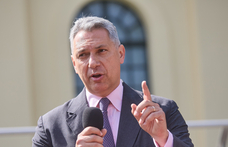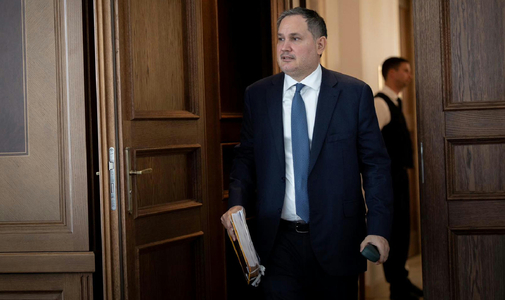In a civilised country, national security organisations are not at the centre of the media spotlight. Especially not where normal criminal acts are concerned. But in Hungary, the National Security Office is at the centre of attention because of its investigation into potentially criminal VAT and customs fraud at the Egymasert Egy-masert Alapitvany (For one another, One differently Foundation).
The names of National Security Office (NBH) employees are not made public. But historians studying the Kadar regime frequently come across names and facts which they would ordinarily keep to themselves. As a historian, I am inclined to accept the deal made during the 1989/90 regime change, under which the secret service's "specialists" were not brought to account and were left to continue working in the successor organisations, so long as they were open about what they had done in the past. However, irregularities in the classification system and the arrogance of the NBH's representatives have forced me to share certain key facts with readers.
Ibolya Simon, a representative of the Egymasert Egy-masert Alapitvany (EEA), was previously an officer in the NBH, and she continues to serve as the NBH's legal representative. She signed the indictment the NBH made of me as a result of an article in the 3 March issue of HVG. She claims that because I accused the NBH of withholding secret service documents, blaming the mentality NBH staff had inherited from the single-party state of the past, I was "constructing conspiracy theories."
The facts. Miklos Herczeg, the NBH officer in charge of classifying secrets, was appointed a junior officer in the Political Investigations Office in 1961. In 1963 he was promoted to the department in charge of counter-espionage measures against Middle Eastern and Far Eastern countries. Laszlo Hellebrand, the classification officer for the Information Officer, ran an informant in Szeged who ran the office of Bishop Kornel Pataky. In the run up to the regime change, he was national security liaison officer in the German Democratic Republic. None of this should be a problem, because it is clear experts should be respected, and classifying state secrets is a job requiring real expertise. It is still reasonable to ask how much objectivity can be expected of someone who was himself involved in creating the documents that he later classified. Given that researchers frequently encounter cases of absurd classifications (for example, the title of an agenda is kept secret, but the contents of that agenda is open) - it is fair to argue that the activities of the classification officers should be subject to institutional control and audit.
Every sign suggests that the NBH is in crisis. Among other things, it is clear from the fact that they employ Ibolya Simon. In her one-and-a-half page indictment, she makes 23 spelling mistakes - making it clear that she is familiar neither with the Hungarian language nor with the workings of a spellchecker. A more serious aspect of the crisis is the fact that she is unable to escape from the thought processes of a party functionary. Dr Simon's foundation, which is staffed by NBH employees, provides money to "charities" which are run by Mrs Jozsef Csaszar. Mrs Csaszar was the director of the Interior Ministry's personnel office. In 1996 she testified that it had been forbidden for employees of the State Defence Authority (AVH) to abuse or torture detainees. She did this when one of the Authority's victims living in Australia recognised one of his former torturers, the AVH officer Tibor Vajda.
So who are these people working in the NBH and linked to the EEA Foundation? It is curious that we find three Szilvasys among the names. Gyorgy Szilvasy is the minister without portfolio in charge of the NBH. Istvan Szilvasy is the director of the Interior Ministry Central Hospital, and Peter Szilvasy, a graphologist and employee of the foundation. The similarity of the names is no coincidence. They are brothers.
Who is in charge of the NBH's files and the agency's computer network - all of which could provide information about the arguments that rage in public life, such as the activities of Janos Martonyi - codenamed Marosvasarhelyi. Mihaly T, the second man at the NBH, worked in the 'youth protection' group in 1989. Gusztav K also worked on youth protection between 1985 and 1987. He ran the informant Peter Morvay. (In 1990, Morvay was the first person to open up about his past as an agent). Gyula M worked in the cultural defence department. Clearly, these people continue to take orders today, and those orders come from Gyorgy Szilvasy and their direct superior, Lajos Galambos.
It is clear that in the recent past the NBH has acted not according to its constitutional duties but has been obeying orders issued idrectly by the political class. This is shown by the way that journalists investigating Gyorgy Szilvasy's summer house were harrassed by NBH agents. This is damaging because ruins the reputation of the officers in the eyes of the outside world. A bigger problem is that NBH authorities are demoralised, since they are being used to carry out tasks for which the people issuing the orders have no consitutional justification. Take Balint Magyar. Only the NBH could have tapped the former education minister's telephone conversations. If this were not the case, the NBH would have unmasked the foreign spy network that was supposedly listening in on ministers' conversations. If it was unable to do this, then the leadership of the NBH should have been sacked. But it is not enough that the NBH was listening in on our minister's conversations. They went further, leaking these conversations abroad. They thereby made both the Hungarian political elite and the leaker himself an object of international ridicule. Karoly Szita's files were leaked in a similar fashion. The original documents were in the NBH's possession, and the NBH is the only organisation that could have provided photocopies of those files to newspapers.
This should not happen in Hungary. These events are on the level of a banana republic. An organisation tasked with protecting the country is being used to satisfy the needs of individual politicians. But this isn't a coincidence. Members of the Antall and Horn governments were aware that Janos Martonyi was compromised, but they kept this information from the public. This has been going on for 17 years. How much longer can it continue for?
Krisztián Ungváry
















